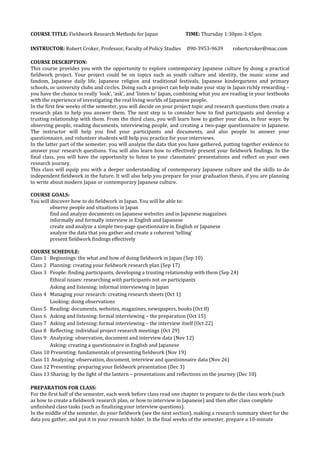
2015 Course Description
- 1. COURSE TITLE: Fieldwork Research Methods for Japan TIME: Thursday 1:30pm-3:45pm INSTRUCTOR: Robert Croker, Professor, Faculty of Policy Studies 090-3953-9639 robertcroker@mac.com COURSE DESCRIPTION: This course provides you with the opportunity to explore contemporary Japanese culture by doing a practical fieldwork project. Your project could be on topics such as youth culture and identity, the music scene and fandom, Japanese daily life, Japanese religion and traditional festivals, Japanese kindergartens and primary schools, or university clubs and circles. Doing such a project can help make your stay in Japan richly rewarding – you have the chance to really ‘look’, ‘ask’, and ‘listen to’ Japan, combining what you are reading in your textbooks with the experience of investigating the real living worlds of Japanese people. In the first few weeks of the semester, you will decide on your project topic and research questions then create a research plan to help you answer them. The next step is to consider how to find participants and develop a trusting relationship with them. From the third class, you will learn how to gather your data, in four ways: by observing people, reading documents, interviewing people, and creating a two-page questionnaire in Japanese. The instructor will help you find your participants and documents, and also people to answer your questionnaire, and volunteer students will help you practice for your interviews. In the latter part of the semester, you will analyze the data that you have gathered, putting together evidence to answer your research questions. You will also learn how to effectively present your fieldwork findings. In the final class, you will have the opportunity to listen to your classmates’ presentations and reflect on your own research journey. This class will equip you with a deeper understanding of contemporary Japanese culture and the skills to do independent fieldwork in the future. It will also help you prepare for your graduation thesis, if you are planning to write about modern Japan or contemporary Japanese culture. COURSE GOALS: You will discover how to do fieldwork in Japan. You will be able to: observe people and situations in Japan find and analyze documents on Japanese websites and in Japanese magazines informally and formally interview in English and Japanese create and analyze a simple two-page questionnaire in English or Japanese analyze the data that you gather and create a coherent ‘telling’ present fieldwork findings effectively COURSE SCHEDULE: Class 1 Beginnings: the what and how of doing fieldwork in Japan (Sep 10) Class 2 Planning: creating your fieldwork research plan (Sep 17) Class 3 People: finding participants, developing a trusting relationship with them (Sep 24) Ethical issues: researching with participants not on participants Asking and listening: informal interviewing in Japan Class 4 Managing your research: creating research sheets (Oct 1) Looking: doing observations Class 5 Reading: documents, websites, magazines, newspapers, books (Oct 8) Class 6 Asking and listening: formal interviewing – the preparation (Oct 15) Class 7 Asking and listening: formal interviewing – the interview itself (Oct 22) Class 8 Reflecting: individual project research meetings (Oct 29) Class 9 Analyzing: observation, document and interview data (Nov 12) Asking: creating a questionnaire in English and Japanese Class 10 Presenting: fundamentals of presenting fieldwork (Nov 19) Class 11 Analyzing: observation, document, interview and questionnaire data (Nov 26) Class 12 Presenting: preparing your fieldwork presentation (Dec 3) Class 13 Sharing: by the light of the lantern – presentations and reflections on the journey (Dec 10) PREPARATION FOR CLASS: For the first half of the semester, each week before class read one chapter to prepare to do the class work (such as how to create a fieldwork research plan, or how to interview in Japanese) and then after class complete unfinished class tasks (such as finalizing your interview questions). In the middle of the semester, do your fieldwork (see the next section), making a research summary sheet for the data you gather, and put it in your research folder. In the final weeks of the semester, prepare a 10-minute
- 2. presentation, a 2500-word report, and a 500-word reflection about your research journey. COURSE REQUIREMENTS: a) look – ‘observe’ what is happening in the field, and take systematic field notes course goal: observe at least one setting, and make field notes b) do – ‘participate’ in what goes on the setting, as much as possible course goal: participate in at least one event c) ask – informally and formally interview people, and possibly asking them to complete a questionnaire course goal: formally interview at least three people, recording them if possible course goal: informally interview as many people as possible course goal: create and give a two-page questionnaire, if appropriate d) read – primary source documents (such as the written rules and regulations of a group, their homepage, correspondence from the group to its members) and secondary source documents (articles and books written about that group by other people, such as journalists and researchers). course goal: read two to three primary source documents, if available course goal: read three secondary source documents e) give a 15-minute presentation in the final class f) write a 2500-word report g) write a 500-word reflection essay h) submit your fieldwork portfolio, with: research sheets + preparatory notes + data ASSESSMENT: Research Plan 10% Due: Class 3 Presentation (about 10 minutes) 20% In: Class 13 Fieldwork folder (with your data and notes) 30% Due: Class 13 Fieldwork report (2500 words – print or blog) 30% Due: Class 13 Fieldwork reflection essay (500 words) 10% Due: Class 13
